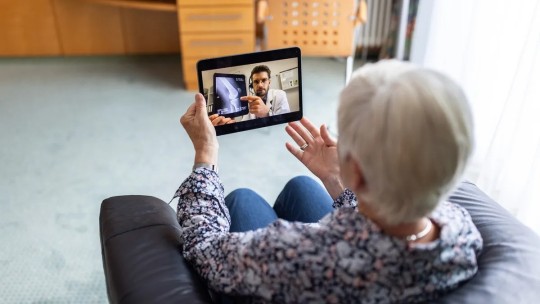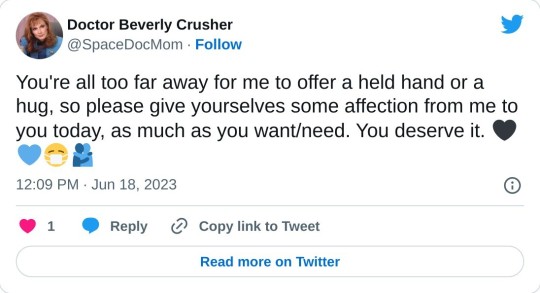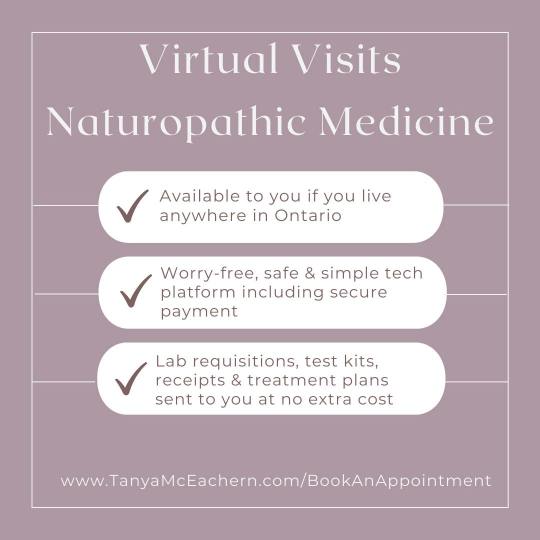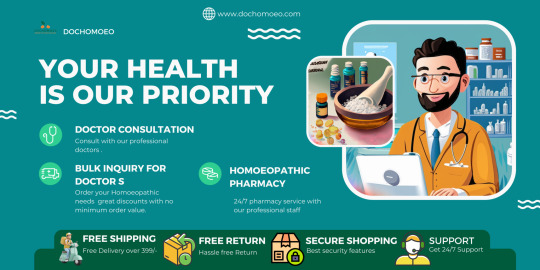#Virtual doctor care
Text
The Future of Virtual Doctor Care: Trends and Predictions

The future of virtual doctor care holds immense promise as technology continues to advance and healthcare delivery undergoes transformational changes. Several trends and predictions are shaping the evolution of virtual doctor care, offering insights into what the future may hold for patients, healthcare providers, and healthcare systems:
Expansion of Telemedicine Services: Telemedicine services will continue to expand and diversify, offering a broader range of healthcare services and specialties through virtual platforms. While telemedicine initially focused on primary care and urgent care services, the future will see the integration of specialty care, behavioral health services, chronic disease management, and preventive care into virtual care models. As technology evolves and regulations evolve to accommodate these changes, patients will have access to a comprehensive array of healthcare services through virtual channels.
Integration of Artificial Intelligence (AI) and Machine Learning: The integration of artificial intelligence (AI) and machine learning technologies will enhance the capabilities of virtual doctor-care platforms, enabling more personalized and predictive healthcare experiences. AI-powered algorithms can analyze patient data, medical histories, and diagnostic images to assist healthcare providers in making accurate diagnoses, recommending treatment options, and predicting patient outcomes. Virtual care platforms will leverage AI-driven chatbots and virtual assistants to enhance patient engagement, provide real-time support, and deliver personalized health information and recommendations.
Adoption of Remote Monitoring and Wearable Devices: Remote monitoring technologies and wearable devices will play an increasingly prominent role in virtual doctor care, enabling continuous monitoring of patients' vital signs, health metrics, and disease markers from the comfort of their homes. Connected devices such as smartwatches, fitness trackers, and medical sensors can collect real-time data and transmit it to healthcare providers for analysis and interpretation. Remote monitoring allows for proactive intervention, early detection of health issues, and personalized treatment adjustments, ultimately improving patient outcomes and reducing healthcare costs.
Embrace of Hybrid Care Models: Hybrid care models that combine virtual and in-person care elements will become more prevalent, offering patients flexibility and choice in how they access healthcare services. Rather than replacing traditional face-to-face interactions, virtual doctor care will complement in-person visits, allowing patients to seamlessly transition between virtual and physical care settings based on their needs and preferences. Hybrid care models will optimize resource utilization, improve care coordination, and enhance patient satisfaction by offering a balanced approach to healthcare delivery.
Focus on Health Equity and Access: Virtual doctor care will increasingly focus on addressing disparities in healthcare access and outcomes, particularly among underserved and marginalized populations. Initiatives aimed at promoting health equity, such as telemedicine reimbursement policies, broadband infrastructure investments, and digital health literacy programs, will help bridge the digital divide and ensure that all patients have access to virtual care services. Virtual doctor care has the potential to overcome geographical barriers, cultural barriers, and socioeconomic barriers, thereby improving healthcare access and reducing disparities in health outcomes.
Emphasis on Data Privacy and Security: As virtual doctor care becomes more widespread, there will be a heightened emphasis on data privacy and security to protect patients' sensitive health information. Healthcare organizations and technology vendors will implement robust cybersecurity measures, encryption protocols, and data governance frameworks to safeguard patient data against unauthorized access, breaches, and cyber threats. Compliance with regulatory requirements, such as HIPAA (Health Insurance Portability and Accountability Act), will remain a top priority to ensure patient confidentiality and trust in virtual care platforms.
In conclusion, the future of virtual doctor care is characterized by expansion, innovation, and a commitment to improving healthcare access, quality, and outcomes. With the integration of advanced technologies, such as AI and remote monitoring, the adoption of hybrid care models, and a focus on health equity and data privacy, virtual doctor care will continue to evolve and redefine the way healthcare is delivered and experienced. As virtual care becomes increasingly integrated into mainstream healthcare delivery models, it has the potential to revolutionize patient care, enhance provider efficiency, and ultimately transform the healthcare landscape for the better.
0 notes
Text
How Virtual Doctor Care Is Making Healthcare More Accessible?

Virtual doctor care is revolutionizing healthcare accessibility by breaking down traditional barriers. Through telemedicine, patients can connect with healthcare professionals from the comfort of their homes, eliminating geographical constraints. Virtual doctor care promotes timely consultations, reduces waiting times, and enhances overall healthcare access, ensuring that more people can receive medical attention and advice when they need it.
0 notes
Text
Virtual Doctor Care: What You Need to Know

Virtual doctor care, or telemedicine, allows patients to consult with healthcare professionals remotely through video calls or phone appointments. It provides convenient access to medical advice, prescriptions, and follow-up appointments. Virtual care is particularly valuable for non-emergency issues, saving time and reducing the need for in-person visits.
0 notes
Text

Doctor Beverly Crusher
@SpaceDocMom
I am always dispensing free hugs and other support in my sickbay for anyone who has been treated poorly by other health care workers because of your race, weight, gender, sex, place of origin, etc. If you can get to my sickbay, I will shower you with kindness. emojis: black heart, blue heart, masked
1:41 PM · Nov 15, 2023
#star trek#doctor crusher#star trek the next generation#star trek memes#star trek tng#support#kindness#care#compassion#health care#healthcare#medicine#inclusion#systemic bigotry#bigotry#virtual hugs#chronic illness#chronic pain#chronic fatigue#disability#gender#gender identity#sexuality#race#weight#spoonies#spoons
24 notes
·
View notes
Text
america really has the worst fucking health "care" system
#first i didna virtual visit so i didnt have to walk on what is obviously a sprained ankle#then they make me go ro urgent care for an x ray#urgent care takes over an hour to give me an x ray and prescribe a painkiller (i am the only patient in the whole facility)#then cvs pharmacy tells me theyre backed up (big surprise cvs can only hire 2 people at a time apparently) and i gotta wait 30 minutes#then 30 minutes pass and all they do is tell me insurance doesnt cover prescriptions (thats a lie ive gotten then before)#then i call 4 different number and get passed to multiple people#and the core of the issue still isnt solved#i went to the doctor at 9am.......its 1:20pm and i have to keep calling people#what if i just killed myself instead?
3 notes
·
View notes
Text
i love that in american culture its so normal to come back to work before you actually feel better that most of my coworkers have just greeted me with “im sorry”
#i cant call out three days in a row without a doctors note#whoms fucking doctor can see them on three days notice even just a virtual visit hello#urgent care and ER dont write notes if they dont find anything. so.
2 notes
·
View notes
Text
I have so many tasks I need to do around the house but this weekend I can’t do anything due to being extremely sick, still, going on over a week.
My friend suggested I book a virtual appointment with Telus Health if I wanted to avoid the hospital as my only way to see a doctor.
In order to book an appointment though they need the front and back of my drivers license as well as a picture RIGHT NOW to verify the photo I submit matches my ID.
That seems like such an unnecessary invasion of privacy. If any ID, why would it not be my healthcard? When we have the appointment they could see that I match my submitted ID.
Right now I look like utter shit from having barely eaten in a whole week and having my phone turn on the front facing camera and needing to look at myself in this state and then submit the photo that will then stay in their records in this state of ill health made me cry and I closed out of it all.
Would I rather lie in the fetal position in terrible abdominal pain for the foreseeable future? No. But I’m starving and sick and I already have a serious eating disorder and body dysmorphia. Being required to take and submit a photo of myself when I am at my absolute worst just to see a doctor who may or may not be able to help without the possibility of a physical exam makes me want to die.
Healthcare in Ontario is fucking impossible.
#it’s so surreal what is involved in seeing a doctor now#it makes me actually want to kill myself because I am in poor health and the barriers and lack of availability now mean#I will continue to experience great suffering and a terrible quality of life due to lack of adequate medical care#it fucking sucks#I know I’m dysregulation right now from being so sick for a week but#what do they expect if I’m signing up to book a virtual appointment with a doctor#do they think I’m gonna be feeling great and willing to jump through fucking hoops?#personal#healthcare#cdnpoli
2 notes
·
View notes
Text
Right now I would like to be locked in a room with Ontario Premier Doug Ford so I can yell, cry, and lecture at him until he makes trans healthcare better in this fucking disaster of a province
#currently trying to get testosterone through a national shortage#while not having a family doctor or endocrinologist#while the trans care clinic I was using got shut down by the government for being virtual care#right before the holidays when everything is closed#so yeah I’m crying about it a bunch#second puber t#about me
14 notes
·
View notes
Text
one good thing about the 21st century is telehealth. if i had to actually make an appt w/ my primary care doctor every time i needed more meds i would lose my mind
#like. the in-person healthcare system is so fucked#i would have to wait weeks to see ''my'' primary care doctor in person and i'm out of my antidepressants now#so i would just be in misery for 2 weeks#but instead i can just make a virtual appt w/ some random doctor and be like hey give me more meds.#and theyll be like 'well hows your dose do we need to adjust-'#and ill be like NAAAUURRR no. its been almost 5 years im happy w my meds just give. me. more.#and theyll be like okay.#same day appointment w/ a copay thats the same as if i went to my doctor in person#today im gonna try to get an amount thats longer than 90 days i cant be paying $100+ every 3 months just to get a refill#the other day my mom was complaining about how she's been on her antidepressants for 10 years-#-and no doctor ever suggested weaning off and she was like 'someone should have suggested that to me-#-bc i just got complacent and now ive been taking antidepressants for 10 years and thats not healthy'#and i was like why are you acting like you have no agency in your own healthcare. if you wanted to wean off then why didnt you just-#-suggest it yourself#the way i perceive healthcare you have to forcibly impose your own agency on doctors be willfull be knowledgable#theyre there to listen to you and diagnose/prescribe based on your direction especially w/ mental health/antidepressants#i weaned myself from 200mg/daily to 100mg/daily bc i was like i dont need this much. i just did it myself
2 notes
·
View notes
Text
Overcoming Barriers To Accessing Virtual Doctor Care

Virtual doctor care, also known as telemedicine, holds immense potential to improve healthcare access and delivery. However, several barriers prevent certain populations from fully benefiting from these services. Addressing these barriers is crucial to ensure equitable access to virtual doctor care. This essay discusses key barriers to accessing virtual doctor care and proposes strategies to overcome them.
Technological Barriers:
a. Lack of Access: Many individuals, particularly in rural or underserved areas, lack access to reliable internet connectivity and digital devices required for virtual consultations.
b. Digital Literacy: Some patients, especially older adults or those with limited education, may struggle with using telemedicine platforms and navigating virtual appointments.
Solution:
Expand broadband infrastructure in rural and underserved areas to improve internet access.
Provide subsidies or loan programs for digital devices to underserved populations.
Offer training programs and user-friendly interfaces to improve patients' digital literacy and confidence in using telemedicine platforms.
Socioeconomic Barriers:
a. Affordability: Virtual doctor care may not be covered by all insurance plans, and out-of-pocket costs can be prohibitive for uninsured or low-income individuals.
b. Language and Cultural Barriers: Language differences and cultural preferences can hinder effective communication and trust between patients and healthcare providers in virtual consultations.
Solution:
Advocate for policies mandating insurance coverage for telemedicine services and expanding reimbursement options for uninsured individuals.
Implement language interpretation services and culturally competent care practices to accommodate diverse patient populations.
Offer sliding scale fees or financial assistance programs to ensure affordability for low-income patients.
Regulatory Barriers:
a. Licensure Restrictions: Healthcare providers must be licensed in the state where the patient is located, limiting the pool of available providers for virtual consultations.
b. Reimbursement Policies: Inconsistent reimbursement policies across payers and states can create uncertainty and financial barriers for healthcare providers offering telemedicine services.
Solution:
Advocate for interstate licensure compacts or reciprocity agreements to facilitate telemedicine practice across state lines.
Streamline and standardize reimbursement policies to ensure fair compensation for telemedicine services and incentivize provider participation.
Privacy and Security Concerns:
a. Data Security Risks: Telemedicine platforms must comply with strict privacy regulations, such as HIPAA, to protect patients' confidential health information from data breaches or unauthorized access.
b. Trust Issues: Patients may be hesitant to share sensitive medical information over virtual platforms due to concerns about privacy and confidentiality.
Solution:
Implement robust encryption and data protection measures to safeguard patient information and mitigate cybersecurity risks.
Educate patients about the security features of telemedicine platforms and reassure them of their privacy rights and protections.
Establish clear protocols for obtaining patient consent and securely transmitting and storing electronic health records during virtual consultations.
Healthcare Disparities:
a. Unequal Access to Specialty Care: Certain specialties, such as mental health or dermatology, may be less accessible through virtual doctor care, exacerbating disparities in healthcare access and outcomes.
b. Limited Reach in Vulnerable Populations: Homebound individuals, individuals with disabilities, and those experiencing homelessness may face additional challenges accessing virtual doctor care due to their unique circumstances.
Solution:
Expand telemedicine services to include a diverse range of medical specialties and multidisciplinary care teams.
Implement outreach programs and mobile telemedicine units to reach vulnerable populations in community settings.
Partner with community organizations and social service agencies to address social determinants of health and provide wraparound support services for underserved individuals.
Conclusion:
Overcoming barriers to accessing virtual doctor care is essential to realize its full potential in improving healthcare access, equity, and outcomes. By addressing technological, socioeconomic, regulatory, privacy, and healthcare disparities, stakeholders can create a more inclusive and accessible telemedicine ecosystem. Collaborative efforts among policymakers, healthcare providers, insurers, and community organizations are needed to ensure that virtual doctor care reaches all individuals, regardless of their background or circumstances.
0 notes
Text
How Virtual Doctor Care Is Changing The Healthcare Game?

Virtual doctor care is transforming healthcare delivery, providing exceptional accessibility and convenience. Patients can connect with healthcare professionals remotely, receiving timely consultations, diagnoses, and prescriptions. This game-changer reduces barriers to healthcare, particularly for those in remote areas. It enhances preventive care, offers cost-effective solutions, and minimizes the strain on traditional healthcare systems.
0 notes
Text
The Future of Virtual Doctor Care: Trends and Predictions

The future of virtual doctor care is poised to undergo transformative changes, driven by technological advancements, shifting healthcare dynamics, and the lessons learned from the global COVID-19 pandemic. Several trends and predictions are emerging that provide a glimpse into the evolving landscape of virtual healthcare.
Continued Telehealth Adoption: The rapid adoption of telehealth during the pandemic has fundamentally changed the way people access medical care. This trend is expected to continue as patients and healthcare providers recognize the convenience and efficiency of virtual consultations. Telehealth platforms are likely to become integrated into routine healthcare delivery, offering a mix of in-person and virtual options to accommodate diverse patient needs.
Remote Patient Monitoring (RPM) Expansion: Advances in wearable technology and IoT devices are facilitating the expansion of remote patient monitoring. Patients can now use devices to measure vital signs, track chronic conditions, and transmit data to healthcare providers in real time. This allows for proactive management of health conditions and early intervention, reducing hospitalizations and improving overall patient outcomes.
Artificial Intelligence (AI) Integration: AI is poised to play a crucial role in virtual doctor care. Machine learning algorithms can analyze vast amounts of medical data to assist in diagnosis, predict patient outcomes, and personalize treatment plans. Virtual assistants powered by AI can enhance the efficiency of healthcare interactions, enabling more streamlined communication between patients and providers.
Enhanced Virtual Care Platforms: Virtual care platforms will evolve to offer a more comprehensive and integrated healthcare experience. This includes features such as secure messaging, video consultations, prescription management, and scheduling tools – all accessible within a unified digital ecosystem. These platforms aim to provide a seamless and user-friendly experience for both patients and healthcare professionals.
Focus on Mental Health Services: The importance of mental health has gained significant recognition, and virtual doctor care will increasingly incorporate mental health services. Telepsychiatry and online counseling services will become more prevalent, addressing the growing demand for accessible mental health support. Virtual platforms offer a discreet and convenient way for individuals to seek mental health assistance.
Global Reach and Health Equity: Virtual doctor care has the potential to bridge healthcare gaps and improve access to medical services globally. Telehealth can overcome geographical barriers, connecting patients with specialists regardless of their location. This has implications for improving health equity, as individuals in remote or underserved areas gain access to a broader range of medical expertise.
Secure Health Data Management: With the increased reliance on virtual healthcare, there will be a heightened emphasis on securing patient health data. Strict privacy regulations and advanced cybersecurity measures will be essential to protect sensitive medical information and ensure patient trust in virtual care platforms.
Collaboration Between Virtual and In-Person Care: The future of virtual doctor care is not about replacing in-person visits but rather integrating seamlessly with traditional healthcare. Collaborative models will emerge, allowing for a continuum of care where virtual consultations complement in-person appointments. This hybrid approach aims to optimize patient outcomes and enhance the overall healthcare experience.
In conclusion, the future of virtual doctor care is marked by technological innovation, increased accessibility, and a holistic approach to healthcare. As these trends continue to unfold, healthcare systems, providers, and technology developers must work collaboratively in shaping a future where virtual care enhances the quality, efficiency, and inclusivity of healthcare delivery.
0 notes
Text

Doctor Beverly Crusher
@SpaceDocMom
You're all too far away for me to offer a held hand or a hug, so please give yourselves some affection from me to you today, as much as you want/need. You deserve it. emojis: black heart, blue heart, masked, hug
1:09 PM · Jun 18, 2023
#doctor crusher#star trek#star trek the next generation#kindness#support#care#compassion#star trek tng#virtual hugs#affection
13 notes
·
View notes
Text
If You Live In Ontario, Make Use Of This Emerging Trend
I bet if you’re reading this, you’re either starting to get really serious about improving your health, or you already are.
Most people will NOT be successful at this on their own, and realize they should talk to a full time health expert. There’s way too much conflicting info out there, and people need help to know which advice applies to them.
Maybe you’re interested in meeting with someone…

View On WordPress
#Cambridge#Health#healthy#Kitchener#Natural Health#naturopath#Naturopathic Medicine#virtual care#virtual doctor appointment#virtual visits
0 notes
Text
Medical Services in the Digital Age: A Comprehensive Guide

In our fast-paced world, access to reliable medical services is evolving. The digital age brings with it a plethora of online options, offering convenience and efficiency for various healthcare needs. Let's delve into the expansive world of medical services available online and explore how they cater to different aspects of our well-being.
Introduction
In the constantly evolving landscape of healthcare, online medical services have become an integral part of our lives. The convenience they offer, coupled with the ease of accessibility, has transformed the way we approach healthcare. This article aims to shed light on the diverse array of online medical services available today, ranging from emergency care to routine consultations.
Types of Online Medical Services
Overview of Various Services
The virtual realm of medical services encompasses a wide range of offerings. From emergency medical services to routine consultations, individuals can access a spectrum of healthcare options from the comfort of their homes. This section provides a broad overview of the different types of online medical services available.
Emergency Medical Services in the Virtual Realm
One of the remarkable aspects of online medical services is the provision of emergency care through virtual platforms. Exploring this facet ensures that individuals can receive prompt medical attention in critical situations, even from a distance.
Exploring the Realm of Online Medical Help
Seeking medical assistance online goes beyond emergencies. This subsection delves into the various ways individuals can find online medical help for non-emergency situations, offering a holistic approach to healthcare.
The Significance of Medical Consultation in the Digital Age
With the shift towards digitalization, medical consultation has found a new platform. Understanding the importance of this shift is crucial for individuals seeking professional guidance for their health concerns.
Accessing Primary Care Online
The Convenience of Finding a Primary Care Physician Online
Locating a primary care physician has never been more convenient. This section discusses how individuals can access primary care services online, ensuring a seamless experience in finding a healthcare professional.
Locating a Primary Care Physician Near You Effortlessly
The geographical barrier to healthcare is diminishing with online platforms. Here, we explore the ease of finding a primary care physician near you and the advantages it brings to healthcare accessibility.
Benefits of Online Doctor Visits for Routine Health Concerns
Routine health concerns can be addressed through online doctor visits, saving time and effort. This subsection highlights the benefits of opting for virtual appointments for day-to-day medical needs.
The Era of Online Prescriptions
The Ease of Obtaining Prescriptions Online
Obtaining prescriptions online has simplified the medication process. This section elaborates on the ease with which individuals can access necessary prescriptions through digital platforms.
Understanding the Process of an Online Doctor Prescription
Navigating the landscape of online doctor prescriptions requires insight. Here, we break down the process, ensuring individuals understand the steps involved in obtaining prescriptions online.
Ensuring the Legitimacy and Safety of Online Prescriptions
While convenience is key, safety should never be compromised. This subsection discusses the importance of ensuring the legitimacy and safety of online prescriptions for a secure healthcare experience.
Virtual Doctor Consultations
The Rise of Virtual Doctor Appointments
Virtual doctor appointments are becoming increasingly prevalent. This section explores the reasons behind their rise and how they contribute to a more accessible and patient-friendly healthcare system.
Navigating the World of Virtual Doctors for Comprehensive Healthcare
The virtual realm allows for comprehensive healthcare through virtual doctors. Understanding the scope and services offered by virtual doctors is crucial for making informed healthcare decisions.
Exploring the Benefits of a Virtual Urgent Care Option
Urgent care doesn't always necessitate a physical visit. Here, we discuss the benefits of opting for virtual urgent care, providing a convenient alternative for those seeking immediate medical attention.
Tailored Medical Services
Catering to Men's Health Care Needs Online
Men's health care services have found a digital home. This section elaborates on how online platforms cater to men's health needs, ensuring tailored and accessible healthcare solutions.
The Convenience of Online Psychiatrist Prescriptions
Mental health is an essential aspect of overall well-being. This subsection explores the convenience of obtaining psychiatrist prescriptions online, addressing the growing importance of mental health care.
Women's Health Care Services in the Digital Realm
Online platforms also cater to women's health care needs. This section discusses the various services available, emphasizing the importance of digital solutions in women's healthcare.
Locating Online Medical Services
Finding Online Doctor Appointments Near You
Proximity matters when it comes to healthcare. This subsection guides individuals on how to find online doctor appointments in their vicinity, ensuring accessibility to healthcare professionals.
Exploring Online Health Clinics in Your Vicinity
Online health clinics are emerging as key players in the digital healthcare landscape. This section explores the services offered by online health clinics, highlighting their role in providing comprehensive healthcare.
The Convenience of Virtual Urgent Care Nearby
Accessing urgent care virtually has never been easier. This subsection discusses the convenience of virtual urgent care nearby, ensuring individuals can address urgent medical needs promptly.
Proximity Matters
Locating Medical Doctors Near You Through Online Platforms
The Significance of Online Doctor Services in Remote Areas
Online doctor services bridge the gap in remote areas where physical access to healthcare might be challenging. This section explores how these services ensure that even individuals in distant locations have access to medical professionals.
The Ease of Accessing Virtual Doctors Online
Accessing healthcare shouldn't be cumbersome. Here, we discuss the ease with which individuals can access virtual doctors online, providing a hassle-free experience for those seeking medical advice.
Conclusion
In conclusion, the digital age has revolutionized the way we approach medical services. The convenience of online options, ranging from emergency care to routine consultations, has made healthcare more accessible than ever. Embracing these digital solutions ensures individuals can take control of their health with ease.
Frequently Asked Questions (FAQs)
Q: Are online prescriptions as reliable as those obtained in-person?
A: Yes, online prescriptions are legitimate and often more convenient. However, it's crucial to ensure you use reputable platforms to guarantee safety.
Q: Can I find specialized healthcare services online?
A: Absolutely. Many platforms cater to specialized healthcare needs, including mental health, women's health, and various other medical specialties.
Q: How do virtual doctor appointments work, and are they covered by insurance?
A: Virtual doctor appointments typically work through secure online platforms. Insurance coverage may vary, so it's advisable to check with your provider for specific details.
Q: What steps can I take to ensure the security of my online medical information?
A: Using secure and reputable platforms, creating strong passwords, and being cautious about sharing personal information online can enhance the security of your medical information.
Q: Are online health clinics a suitable alternative to traditional brick-and-mortar clinics?
A: Online health clinics offer convenience but may not replace all aspects of traditional clinics. They are a valuable supplement, providing accessible and efficient healthcare options.
#medical services#primary care physician near me#online doctor prescription#virtual doctor appointment
0 notes
Text

Virtual Clinic | Telemed MD
A Virtual Clinic revolutionizes healthcare with online consultations. Connect with licensed professionals for medical advice, prescriptions, and non-emergency care from anywhere. Experience convenient and secure virtual visits, saving time and ensuring accessibility. Prioritize your health with the Virtual Clinic—your comprehensive and efficient solution for personalized healthcare services. Modern healthcare is virtually delivered for your convenience. For additional details regarding our comprehensive Virtual Walk-in Clinic services, please don't hesitate to contact us at 888 350-2323.
#Virtual Walkin Clinic#Virtual Doctor#Online Walk In Clinic#Virtual Care#virtual clinic#virtual walk in clinic toronto
0 notes